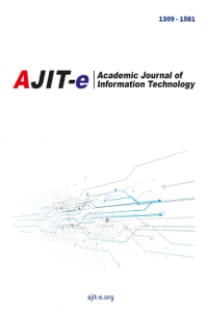Web 2.0 for Knowledge Management in Organizations and Their Effects on Tacit Knowledge Sharing and Perceived Learning
Web 2.0 for Knowledge Management in Organizations and Their Effects on Tacit Knowledge Sharing and Perceived Learning
Web 2.0, Knowledge Management, Case study, Individual. Tacit knowledge Perceived learning,
___
- Alavi, M. and Tiwana, A. ( 2002) Knowledge integration in virtual teams: the potential role of KMS, Journal of the American Society for Information Science and Technology, 53, 1029-1037
- Anderson,P,(2007)What is Web 2.0?Ideas,technologies and implications for education. JISC reports. http://www.jisc.ac.uk/media/documents/techwatch/tsw0701b.pdf
- Desouza,K.C.(2003) Facilitating tacit knowledge exchange, Communication of ACM ,46,6 , 85-88
- Eccleston, D., & Griseri, L. (2008) How does web 2.0 stretch traditional influencing patterns?, Paper presented at Market Research Society Annual Conference,
- Eisenhardt, K. M.(1989) ,Building theories from case study research, Academy of Management Review, ,14:,4, 532-550.
- Ganesh,J. and Padmanabhuni, Srinivas,(2007) Web 2.0: Conceptual Framework and Research Directions, . Proceedings of AMCIS
- Grover, V., Davenport, T. H. (2003) General Perspectives on Knowledge Management: Fostering a Research Agenda, Journal of Management Information Systems, 18,1, 5-21
- Kane, Gerald C. and Fichman, Robert G.(2009) The Shoemaker's Children: Using Wikis For Information Systems Teaching, Research, And Publication, MIS Quarterly ,33,1, 1-17
- Kulkarni, U.R., Ravindran, S., and Freeze, R., (2006)A knowledge management success model: Theoretical development and empirical validation, Journal of Management Information Systems,23, 3, 309-347
- Lee, M. and Lan, Y., (2007) From Web 2.0 to conversational knowledge management: towards collaborative Intelligence, Journal of Entrepreneurship Research ,2,2 .47-62.
- Levinson, M..(2006) The ABCs of KM.," CIO Magazine. Retrieved November 25, 2006, from http://www.cio.com/research/knowledge/edit/kmabcs.html
- Mindel, J. L. and Verma, S.(2006) Wikis For Teaching And Learning ,Communications of AIS,18,1-23
- Minocha, S. & Thomas P.G. (2007) Collaborative learning in a Wiki Environment: Experiences from a software engineering course, New Review of Hypermedia and Multimedia, 13, 2, 187-209.
- Parameswaran, M. (2007) Social Computing: An Overview, Communications of AIS, 19,.762-780
- Poynter, R..(2008) Facebook: the future of networking with customers. International Journal of Market Research, 50,1 11-12,
- Richards,B. (2009) A social software/Web 2.0 approach to collaborative knowledge engineering, ,Information Sciences ,179, 2515-2523
- Sarker, S & Lee, A.( 2000) Using a Positivist Case Research Methodology to Test Three Competing Theories-in-Use of Business Process Redesign, Proceedings of the International Conference on Information Systems, Brisbane.
- Sarker, S & Lee, A., (2002)Using a Positivist Case Research Methodology to Test Three Competing Theories-in-Use of Business Process Redesign, Journal of the Association for Information Systems, 2, 7
- Shanks, G., (2002). Guidelines For Conducting Positivist Case Study Research In Information Systems, Australian Journal of Information Systems, Special Issue
- Wagner, C. (2006) ,Breaking the knowledge acquisition bottleneck through conversational knowledge management, Information Resources Management Journal, 19, 1, 70-83.
- Wagner. C, Majchrzak, A.,(2007) Enabling Customer-Centricity Using Wikis and the Wiki Way, Journal of Management Information Systems, 23, 3, 17 - 43
- Yin, R. K. (2003) Case study research: Design and methods, (3rd ed.). Thousand Oaks, CA: Sage.
- Yayın Aralığı: 4
- Yayıncı: AKADEMİK BİLİŞİM ARAŞTIRMALARI DERNEĞİ
Glocalization Tendency in Local Newspapers "Merhaba Arapça" Case
Yerel Gazetelerde Küyerelleşme Eğilimi: "Merhaba Arapça" Örneği
Dijital Veri Güvenliği Farkındalığı Ölçeğinin Geliştirilmesi
Eray YILMAZ, Yusuf Levent ŞAHİN, Yavuz AKBULUT
Sosyal Medya Bağımlılığı Ölçeğinin Geliştirilmesi
Aylin TUTGUN-ÜNAL, Levent DENİZ
